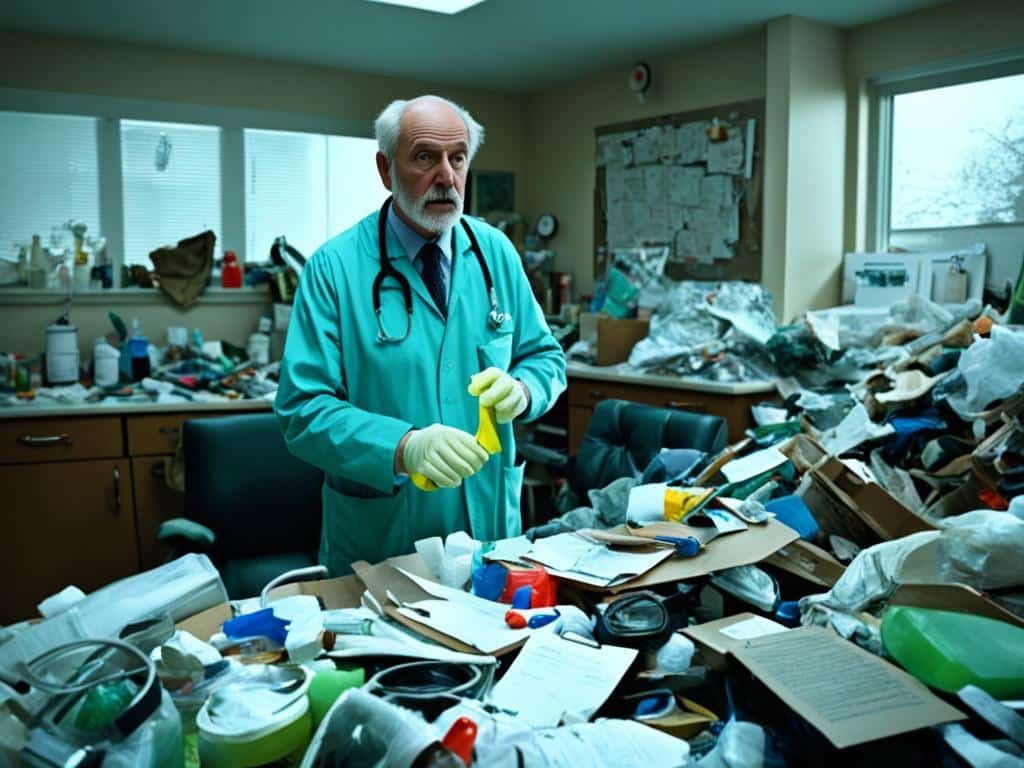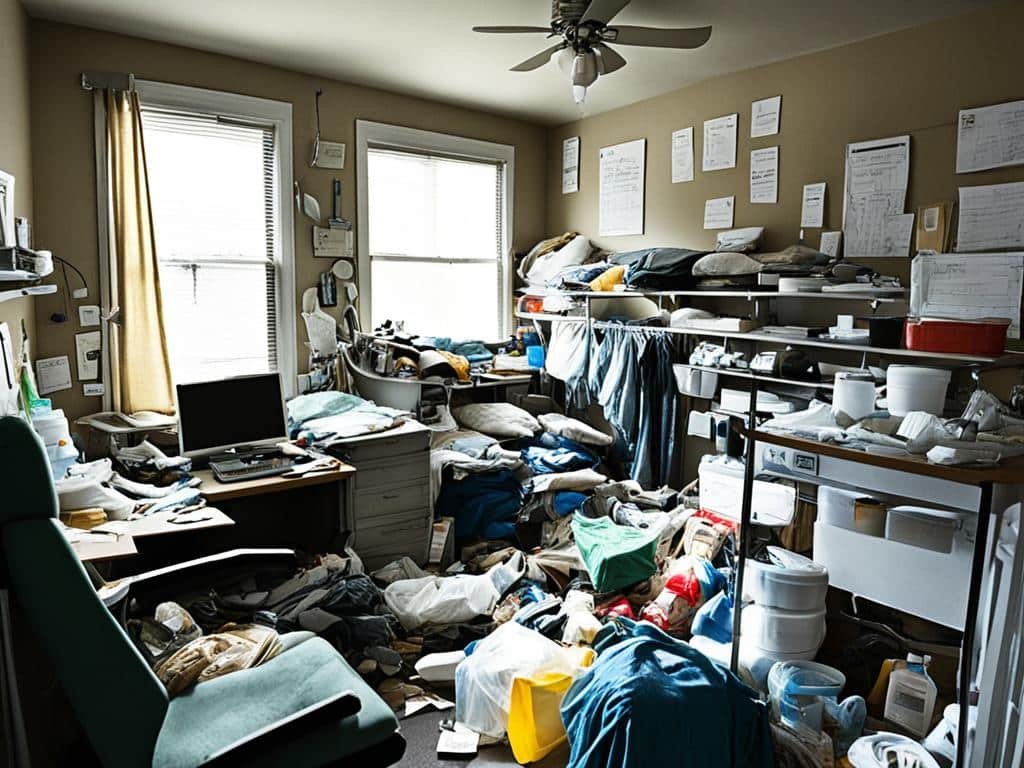Have you ever entered someone’s home and felt an overwhelming sense of chaos and neglect? It’s a disconcerting experience, one that sticks with you long after you’ve left. But what if that home belonged to someone you care about deeply? What if the chaos and neglect were symptoms of a complex behavioral disorder known as Diogenes Syndrome?
Diogenes Syndrome (DS), also known as elderly hoarding disorder, is a condition that primarily affects older individuals, both men and women. It is characterized by poor personal hygiene, social isolation, hoarding, and an unkempt living environment. For those living with DS, the disorder can lead to various health and social problems, making it essential to recognize the signs, understand the causes, and explore treatment options.
In this article, we will delve into the world of Diogenes Syndrome. We will explore the signs and symptoms to help you recognize when someone may be affected by this disorder. We will also discuss common risk factors and triggers, as well as the diagnosis process and available treatment options. Additionally, we will provide guidance on how to support someone with DS, offering strategies for compassionate care.
By raising awareness and understanding about DS, we can create a more empathetic and supportive society. Together, we can improve the quality of life for individuals living with this challenging disorder.
Key Takeaways:
- Diogenes Syndrome is a complex behavioral disorder characterized by poor personal hygiene (self-neglect syndrome), social isolation, hoarding, and an unkempt living environment.
- Recognizing the signs of DS is crucial for early intervention and support.
- Age, isolation, and underlying mental health conditions are common risk factors for developing DS.
- A comprehensive medical evaluation and psychological assessment are essential for diagnosing Diogenes Syndrome.
- Treatment options for DS may include medication, therapy, social support, and community resources.
Understanding Diogenes Syndrome
Diogenes Syndrome is a behavioral disorder characterized by extreme self-neglect, compulsive hoarding, and social isolation. It is named after the Greek philosopher Diogenes, who lived a minimalist and unconventional lifestyle. The philosophy behind the name reflects the resemblance between the living conditions of individuals with DS and Diogenes’ choice to live in a barrel.
Diogenes Syndrome can be classified into two forms: primary and secondary. Primary DS refers to cases where the condition is not a result of a pre-existing mental health condition. In contrast, secondary it occurs in individuals who have another mental health disorder alongside the syndrome.
Recognizing the Signs of Diogenes Syndrome
Recognizing the signs of Diogenes Syndrome is crucial for early intervention and support. Common signs and symptoms include:
- Extreme self-neglect: Individuals with DS often neglect basic personal hygiene and fail to maintain their living environment.
- Poor personal hygiene: They may have unkempt appearance, unwashed clothes, and poor dental health.
- Social isolation: People with DS withdraw from social interactions and may avoid contact with others.
- Hoarding: Accumulating excessive amounts of objects and having difficulty discarding them is a common characteristic.
- Unsanitary living conditions: Their homes may be cluttered, dirty, and infested with pests.
- Refusal of assistance or intervention: Individuals with DS may resist help, making it challenging to provide support.
Additionally, individuals with Diogenes Syndrome may demonstrate a lack of insight into their condition, distrust of society or strangers, extreme social anxiety, and aggressive behavior.

| Signs and Symptoms | Description |
|---|---|
| Extreme self-neglect | Individuals neglect personal hygiene and living conditions. |
| Poor personal hygiene | Unkempt appearance, unwashed clothes, and poor dental health. |
| Social isolation | Withdrawal from social interactions and avoidance of contact. |
| Hoarding | Accumulation of excessive objects and difficulty discarding them. |
| Unsanitary living conditions | Cluttered, dirty homes infested with pests. |
| Refusal of assistance or intervention | Resistance to help, making support challenging. |
Common Risk Factors and Triggers
Several risk factors and triggers contribute to the development of Diogenes Syndrome. It is important to understand these factors in order to intervene and provide appropriate care for individuals with the condition. The key risk factors and triggers include:
Age and Isolation
Age and isolation are significant risk factors for DS. The condition is most prevalent in older individuals who live alone. As people age, they may become more vulnerable to neglecting their personal hygiene and living environment. Social isolation can further exacerbate these behaviors, as individuals may lack social support or someone to notice and address their declining self-care.
Underlying Mental Health Conditions
Underlying mental health conditions are closely associated with DS. Disorders such as schizophrenia, depression, dementia, and addiction can contribute to the development or worsening of the syndrome. These conditions may impair an individual’s ability to maintain personal hygiene, live in a clean environment, or engage in social interactions.
Life Events as Catalysts for Diogenes Syndrome
Life events can act as catalysts for the onset of DS. Major life changes such as the loss of a loved one, retirement, divorce, and traumatic experiences can trigger or exacerbate the symptoms of the syndrome. These events may disrupt an individual’s daily routine, leading to a decline in self-care and an increased tendency towards hoarding and social isolation.
| Risk Factors | Triggers |
|---|---|
| Age | Loss of a loved one |
| Isolation | Retirement |
| Underlying mental health conditions | Divorce |
| Life events | Traumatic experiences |
Understanding these risk factors and triggers is essential for healthcare professionals and caregivers. By identifying individuals at risk and recognizing the factors that contribute to the development of Diogenes Syndrome, appropriate intervention and care can be provided to improve their overall well-being.
Diagnosing Diogenes Syndrome
Diagnosing Diogenes Syndrome can be challenging due to its complex nature and the reluctance of individuals with the syndrome to seek help. However, a comprehensive medical evaluation and psychological assessment are essential steps in the diagnostic process.
Medical professionals may conduct physical exams, blood screenings, and imaging tests to rule out underlying medical conditions and assess the individual’s overall health. These medical evaluations help eliminate other possible causes of the symptoms and provide a baseline understanding of the individual’s physical well-being. By ruling out potential medical explanations, healthcare professionals can focus on assessing the behavioral and psychological aspects of Diogenes Syndrome.
In addition to medical evaluations, psychological assessments and interviews are crucial in uncovering the presence of Diogenes Syndrome and any coexisting mental health disorders. These assessments utilize standardized questionnaires and interviews to evaluate an individual’s thoughts, feelings, behaviors, and overall mental well-being. They help healthcare professionals gather information about the individual’s self-neglect, hoarding tendencies, social isolation, and other relevant symptoms. By understanding the individual’s psychological profile, healthcare professionals can make an accurate diagnosis of Diogenes Syndrome and any coexisting mental health conditions.
Accurate diagnosis is key to providing appropriate treatment and support for individuals with Diogenes Syndrome. Through a combination of medical evaluations and psychological assessments, healthcare professionals can gain a comprehensive understanding of the individual’s condition and develop a tailored treatment plan. Early diagnosis and intervention can significantly improve the individual’s prognosis and quality of life.

Diagnostic Steps for Diogenes Syndrome
| Step | Description |
|---|---|
| 1 | Medical Evaluation |
| 2 | Physical Exams |
| 3 | Blood Screenings |
| 4 | Imaging Tests |
| 5 | Psychological Assessment |
| 6 | Questionnaires |
| 7 | Interviews |
| 8 | Diagnosis and Treatment Plan |
Exploring Treatment Options for Diogenes Syndrome
Effectively managing Diogenes Syndrome and improving individuals’ quality of life involves exploring various treatment options. These options encompass a combination of medication, therapy, social support, and community resources. By implementing these approaches, individuals with Diogenes Syndrome can find relief and support in their journey towards recovery and well-being.
The Role of Medication and Therapy
Medication plays a crucial role in addressing specific symptoms associated with Diogenes Syndrome, such as anxiety or depression. Prescribed by healthcare professionals, these medications can help alleviate distress, stabilize moods, and improve overall mental well-being. Additionally, therapy, particularly cognitive-behavioral therapy, can be instrumental in individuals developing coping strategies, enhancing their insight into their condition, and promoting positive behavioral changes.
Social Support and Community Resources
In addition to medication and therapy, social support is essential in the treatment of Diogenes Syndrome. Support from family, friends, and support groups can provide individuals with emotional reassurance, understanding, and practical assistance. Connecting with others who have similar experiences can foster a sense of belonging and reduce feelings of isolation. Additionally, community resources such as home healthcare services and local outreach programs can provide comprehensive care and aid in meeting the specific needs of individuals with Diogenes Syndrome.
Ethical Considerations in Care
While providing treatment for Diogenes Syndrome, healthcare professionals and caregivers must navigate ethical considerations to ensure compassionate and effective care. Respecting an individual’s autonomy is paramount, allowing them to make decisions about their treatment and care to the best of their abilities. It is equally important to prioritize their safety and address potential risks associated with self-neglect or hoarding behavior. By approaching care with empathy, compassion, and a commitment to ethical principles, healthcare professionals and caregivers can create a supportive environment that promotes the overall well-being of individuals with Diogenes Syndrome.
| Treatment Options | Description |
|---|---|
| Medication | Prescribed medication to address specific symptoms like anxiety or depression |
| Therapy | Cognitive-behavioral therapy to develop coping strategies and improve insight |
| Social Support | Support from family, friends, and support groups for emotional and practical assistance |
| Community Resources | Access to home healthcare services and local outreach programs for comprehensive care |
Complications and Public Health Concerns
Diogenes Syndrome can give rise to various complications and raise significant public health concerns. The behavior of self-neglect puts individuals at a higher risk of experiencing health problems, including malnutrition, dehydration, infections, and skin conditions. The hoarding aspect of the syndrome can attract pests, create fire hazards, and limit mobility within homes, further exacerbating the risk of accidents and injuries.
Moreover, Diogenes Syndrome can have a far-reaching impact on both the lifespan and quality of life of affected individuals. The self-isolation and neglect of personal hygiene contribute to social isolation, leading to the deterioration of physical health and mental well-being. The lack of social connections and support networks further compound the challenges faced by individuals with the syndrome.
To ensure the safety and well-being of individuals with Diogenes Syndrome, it is crucial for healthcare professionals, communities, and caregivers to recognize these complications and public health concerns. By understanding the risks involved, appropriate action can be taken to address the complex needs of individuals with Diogenes Syndrome and create a supportive environment that promotes their overall health and quality of life.

Supporting Someone with Diogenes Syndrome
Supporting someone with Diogenes Syndrome requires understanding, empathy, and effective communication. As a caregiver, you play a critical role in providing physical and emotional support to the individual, while also setting boundaries to ensure your own well-being.
Developing a trusting relationship: Building trust with the person affected by Diogenes Syndrome is crucial. Show compassion, respect, and patience in your interactions, allowing them to feel comfortable and supported.
Actively listening: Listen attentively to their concerns, feelings, and experiences. It is essential to give them a safe space to express themselves and to understand their perspective without judgment.
Providing reassurance: Individuals with DS often experience feelings of loneliness, anxiety, and low self-esteem. Offer reassurance and encouragement to help boost their confidence and self-worth.
Offering practical assistance with daily tasks: Help with basic activities such as personal hygiene, housekeeping, and meal preparation. Your practical support can make a significant difference in their overall well-being.
Practicing self-care: Taking care of yourself is crucial in your role as a caregiver. Prioritize your own physical and mental well-being by seeking support from professionals and joining support groups. This will enable you to provide the best care possible.
Addressing challenges and ethical dilemmas: Supporting someone with Diogenes Syndrome can present unique challenges and ethical dilemmas. Be prepared to navigate difficult situations and seek guidance from professionals or support groups when needed.
Conclusion
In conclusion, Diogenes Syndrome is a complex behavioral disorder that requires awareness, understanding, and compassion from healthcare professionals, communities, and caregivers. By recognizing the signs, understanding the risk factors, and promoting early intervention, we can improve the diagnosis and treatment of Diogenes Syndrome.
Providing effective care through medication, therapy, social support, and community resources is vital in enhancing the quality of life for individuals with the syndrome. By advocating for awareness and compassion, we can create a society that supports and empowers individuals with Diogenes Syndrome to lead fulfilling lives.
The Importance of Awareness and Compassion
Awareness and compassion are essential in addressing the challenges faced by individuals with Diogenes Syndrome. By raising awareness about the syndrome, we can promote early identification and intervention, leading to better outcomes for those affected. It is crucial for healthcare professionals, communities, and caregivers to gain a deeper understanding of the complexities of the disorder and approach it with empathy and compassion.
Moving Toward a Better Quality of Life
By embracing awareness and compassion, we can move toward a better quality of life for individuals with Diogenes Syndrome. Through comprehensive care, including appropriate treatment modalities and support systems, we can help individuals with the syndrome reclaim their well-being, improve their living conditions, and reintegrate into society.
Together, let us work towards an inclusive and compassionate society where those with DS receive the support they need to lead fulfilling and dignified lives.
FAQ
What is Diogenes Syndrome?
Diogenes Syndrome, also known as elderly hoarding disorder, is a complex behavioral condition characterized by poor personal hygiene, social isolation, hoarding, and an unkempt living environment. It primarily affects older individuals, both men and women, and can lead to various health and social problems if left untreated.
What is the philosophy behind the name Diogenes Syndrome?
The name Diogenes Syndrome is derived from the Greek philosopher Diogenes, who lived a minimalist and unconventional lifestyle. The philosophy behind the name reflects the resemblance between the living conditions of individuals with Diogenes Syndrome and Diogenes’ choice to live in a barrel.
What are the primary and secondary forms of Diogenes Syndrome?
Diogenes Syndrome can be classified into two forms: primary and secondary. Primary DS refers to cases where the condition is not a result of a pre-existing mental health condition. In contrast, secondary DS occurs in individuals who have another mental health disorder alongside the syndrome.
What are the signs of Diogenes Syndrome?
Common signs and symptoms of Diogenes Syndrome include extreme self-neglect, poor personal hygiene, social isolation, hoarding, unsanitary living conditions, and refusal of assistance or intervention. Individuals withDS may also demonstrate a lack of insight into their condition, distrust of society or strangers, extreme social anxiety, and aggressive behavior.
What are the common risk factors and triggers for Diogenes Syndrome?
Age and isolation are significant risk factors for Diogenes Syndrome, as the condition is most prevalent in older individuals who live alone. Underlying mental health conditions, such as schizophrenia, depression, dementia, and addiction, are also associated with Diogenes Syndrome. Life events, including the loss of a loved one, retirement, divorce, and traumatic experiences, can act as triggers for the onset of the syndrome.
How is Diogenes Syndrome diagnosed?
Diagnosing Diogenes Syndrome can be challenging due to its complex nature and the reluctance of individuals with the syndrome to seek help. However, a comprehensive medical evaluation and psychological assessment are essential steps in the diagnostic process. Medical professionals may conduct physical exams, blood screenings, and imaging tests to rule out underlying medical conditions and assess the individual’s overall health. Psychological assessments and interviews can help uncover the presence of Diogenes Syndrome and any coexisting mental health disorders.
What are the treatment options for Diogenes Syndrome?
Treatment approaches for Diogenes Syndrome may involve a combination of medication, therapy, social support, and community resources. Medications can be used to address specific symptoms like anxiety or depression, while therapy, such as cognitive-behavioral therapy, can help individuals develop coping strategies and improve their insight into their condition. Social support from family, friends, and support groups can provide emotional and practical assistance. Community resources, such as home healthcare services and local outreach programs, can also contribute to comprehensive care. Ethical considerations, such as respecting autonomy and ensuring safety, should guide healthcare professionals and caregivers in providing compassionate and effective care.
What are the complications and public health concerns associated with Diogenes Syndrome?
Diogenes Syndrome can lead to various complications and pose public health concerns. Self-neglect can result in serious health risks, such as malnutrition, dehydration, infections, and skin conditions. Hoarding behavior can attract pests, cause fire hazards, and limit mobility within homes. The syndrome can also impact lifespan and quality of life, with individuals experiencing social isolation, deteriorating physical health, and reduced overall well-being.
How can I support someone with Diogenes Syndrome?
Supporting someone with Diogenes Syndrome requires understanding, empathy, and effective communication. Caregivers play a critical role in providing physical and emotional support, while also setting boundaries to ensure their own well-being. Strategies for supporting someone with the syndrome include developing a trusting relationship, actively listening, providing reassurance, and offering practical assistance with daily tasks. It is essential for caregivers to practice self-care, seek support from professionals and support groups, and address any challenges or ethical dilemmas that may arise.










